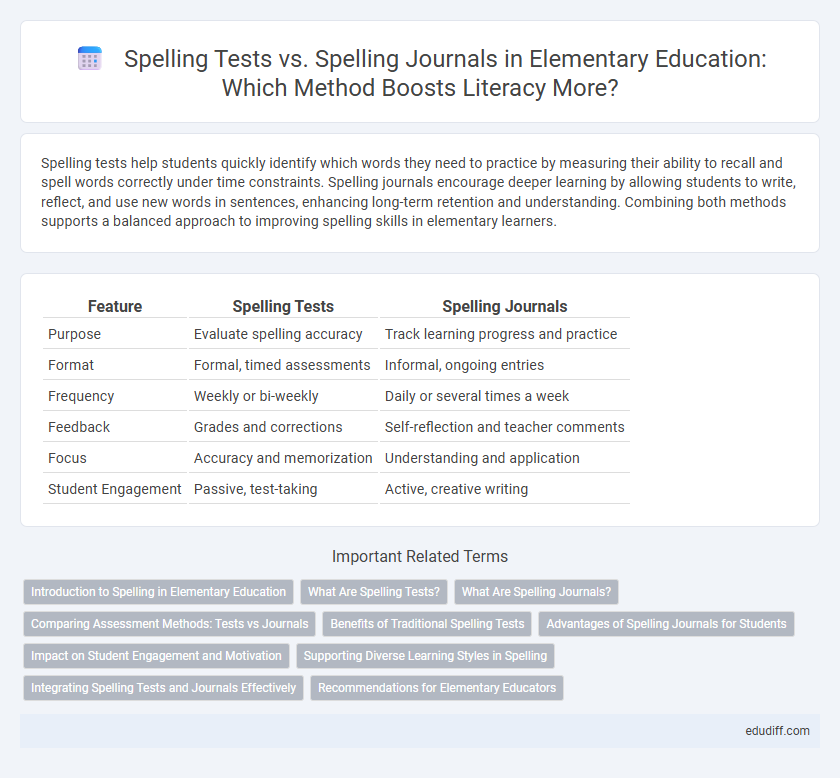Spelling tests help students quickly identify which words they need to practice by measuring their ability to recall and spell words correctly under time constraints. Spelling journals encourage deeper learning by allowing students to write, reflect, and use new words in sentences, enhancing long-term retention and understanding. Combining both methods supports a balanced approach to improving spelling skills in elementary learners.
Table of Comparison
| Feature | Spelling Tests | Spelling Journals |
|---|---|---|
| Purpose | Evaluate spelling accuracy | Track learning progress and practice |
| Format | Formal, timed assessments | Informal, ongoing entries |
| Frequency | Weekly or bi-weekly | Daily or several times a week |
| Feedback | Grades and corrections | Self-reflection and teacher comments |
| Focus | Accuracy and memorization | Understanding and application |
| Student Engagement | Passive, test-taking | Active, creative writing |
Introduction to Spelling in Elementary Education
Spelling tests provide a structured way to assess students' ability to memorize and recall word spellings, reinforcing accurate writing skills in elementary education. Spelling journals encourage students to explore word patterns, phonics, and personal connections to vocabulary, promoting deeper understanding and long-term retention. Introducing both methods helps young learners develop balanced spelling proficiency through assessment and reflective practice.
What Are Spelling Tests?
Spelling tests are a structured evaluation method where students write down words dictated by the teacher to assess their spelling accuracy. They provide measurable data on students' knowledge of specific vocabulary and highlight areas needing improvement. Regular use of spelling tests helps track progress and reinforces memorization of correct word forms.
What Are Spelling Journals?
Spelling journals are personalized notebooks where students record new words, practice spelling patterns, and reflect on their learning progress. These journals help reinforce vocabulary through daily writing exercises and enable tracking of improvement over time. Unlike traditional spelling tests that assess memorization, spelling journals promote active engagement and deeper understanding of word structures.
Comparing Assessment Methods: Tests vs Journals
Spelling tests provide a structured and timed way to measure students' accuracy and recall of specific words, offering clear data on immediate retention. Spelling journals encourage ongoing practice and reflection, allowing students to internalize spelling patterns and track their progress over time. Assessments through tests capture short-term performance, while journals support long-term learning and development of spelling skills.
Benefits of Traditional Spelling Tests
Traditional spelling tests provide a structured way to assess students' spelling accuracy and retention of vocabulary, helping teachers identify areas where improvement is needed. These tests enhance memory retention through repetition and immediate feedback, enabling learners to solidify their understanding of correct spellings. Regular assessments also encourage consistent study habits, which contribute to stronger foundational literacy skills in elementary students.
Advantages of Spelling Journals for Students
Spelling journals enhance vocabulary retention by encouraging students to write and reflect on new words regularly, promoting deeper learning compared to one-time tests. They provide personalized feedback opportunities, allowing learners to track progress and identify challenging words over time. This consistent practice helps improve spelling skills and builds confidence in writing.
Impact on Student Engagement and Motivation
Spelling tests often create pressure, leading to anxiety that can diminish student engagement and motivation. In contrast, spelling journals encourage active participation and reflection, fostering a more positive attitude toward learning. This personalized approach enhances retention and boosts students' confidence in their spelling abilities.
Supporting Diverse Learning Styles in Spelling
Spelling tests cater to auditory and visual learners by reinforcing memorization and recall through repetition and pronunciation exercises. Spelling journals support kinesthetic and reflective learners by encouraging hands-on practice and personal connection to words through writing and drawing. Combining both methods creates a balanced approach that addresses various learning preferences in elementary classrooms.
Integrating Spelling Tests and Journals Effectively
Integrating spelling tests and spelling journals enhances elementary students' retention and application of vocabulary by combining assessment with consistent practice. Spelling tests provide measurable checkpoints, while journals encourage reflection and personalized learning through daily writing and review. Using both tools effectively supports deeper understanding and improved spelling skills over time.
Recommendations for Elementary Educators
Elementary educators should emphasize consistent practice by incorporating both spelling tests and spelling journals to reinforce word recognition and application. Spelling journals encourage personalized learning and improve retention through writing, while spelling tests provide measurable progress and highlight areas needing improvement. Balancing these strategies supports diverse learning styles and promotes long-term spelling proficiency in young students.
Spelling Tests vs Spelling Journals Infographic

 edudiff.com
edudiff.com